WEL303A: Social Science Essay on Human Rights and Obligations
VerifiedAdded on 2022/11/29
|7
|2034
|73
Essay
AI Summary
This essay delves into the multifaceted nature of human rights, exploring their significance in recognizing individual and collective worth within a global community. It examines the Universal Declaration of Human Rights (UDHR) and the ethical challenges that arise when balancing individual rights with societal obligations, particularly in the context of contemporary Australia. The essay discusses various articles of the UDHR, such as the rights to food, safety, freedom of thought, and social security, highlighting the corresponding responsibilities these rights entail. It analyzes real-life examples, including discrimination in the workplace, the treatment of refugees, and issues related to children's rights, to illustrate the ethical dilemmas and violations of human rights that can occur. The essay emphasizes the importance of moral values, ethics, and cultural understanding in navigating the complexities of balancing rights and responsibilities, ultimately arguing for the need to uphold human rights while acknowledging individual and societal obligations.
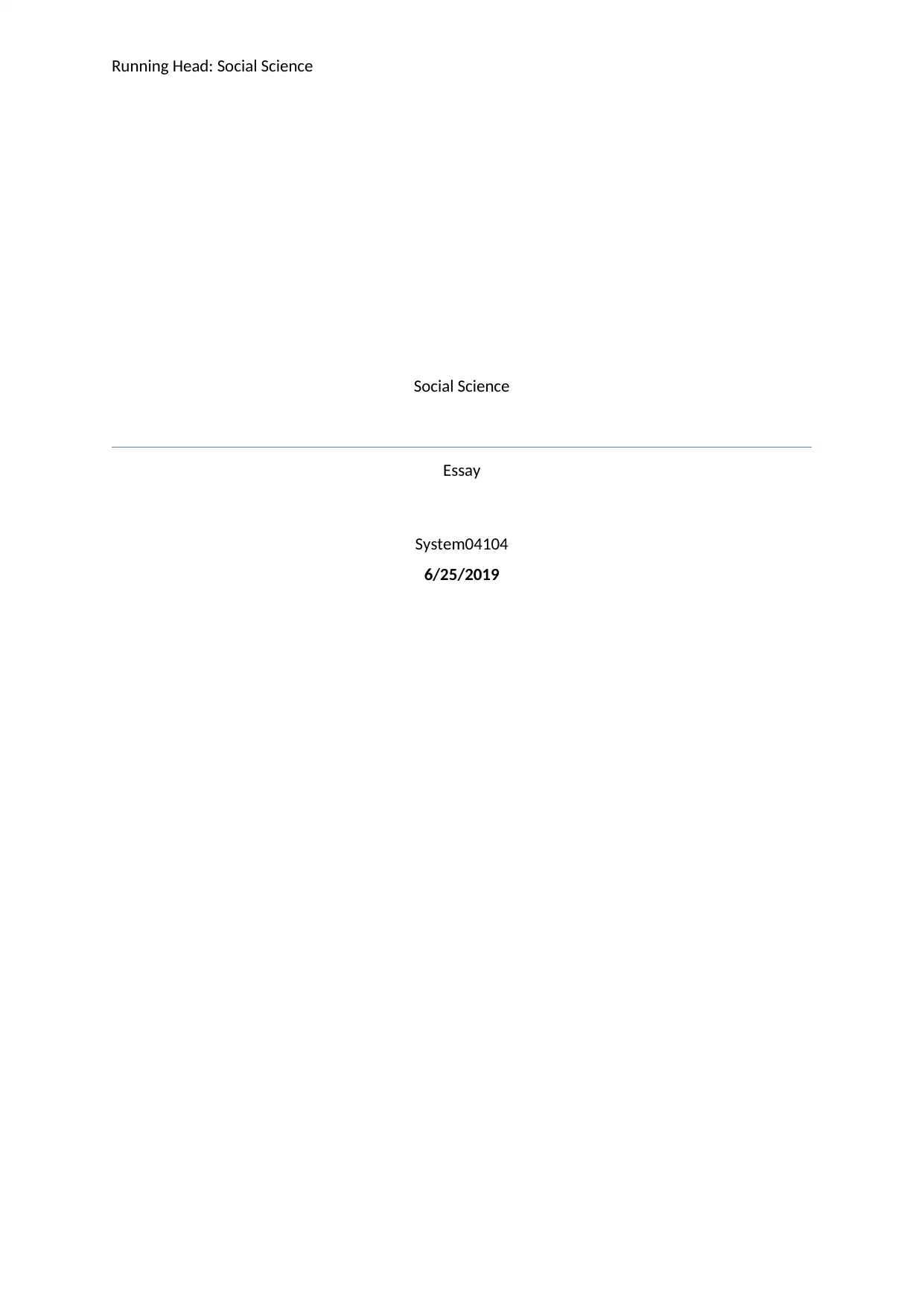
Running Head: Social Science
Social Science
Essay
System04104
6/25/2019
Social Science
Essay
System04104
6/25/2019
Paraphrase This Document
Need a fresh take? Get an instant paraphrase of this document with our AI Paraphraser
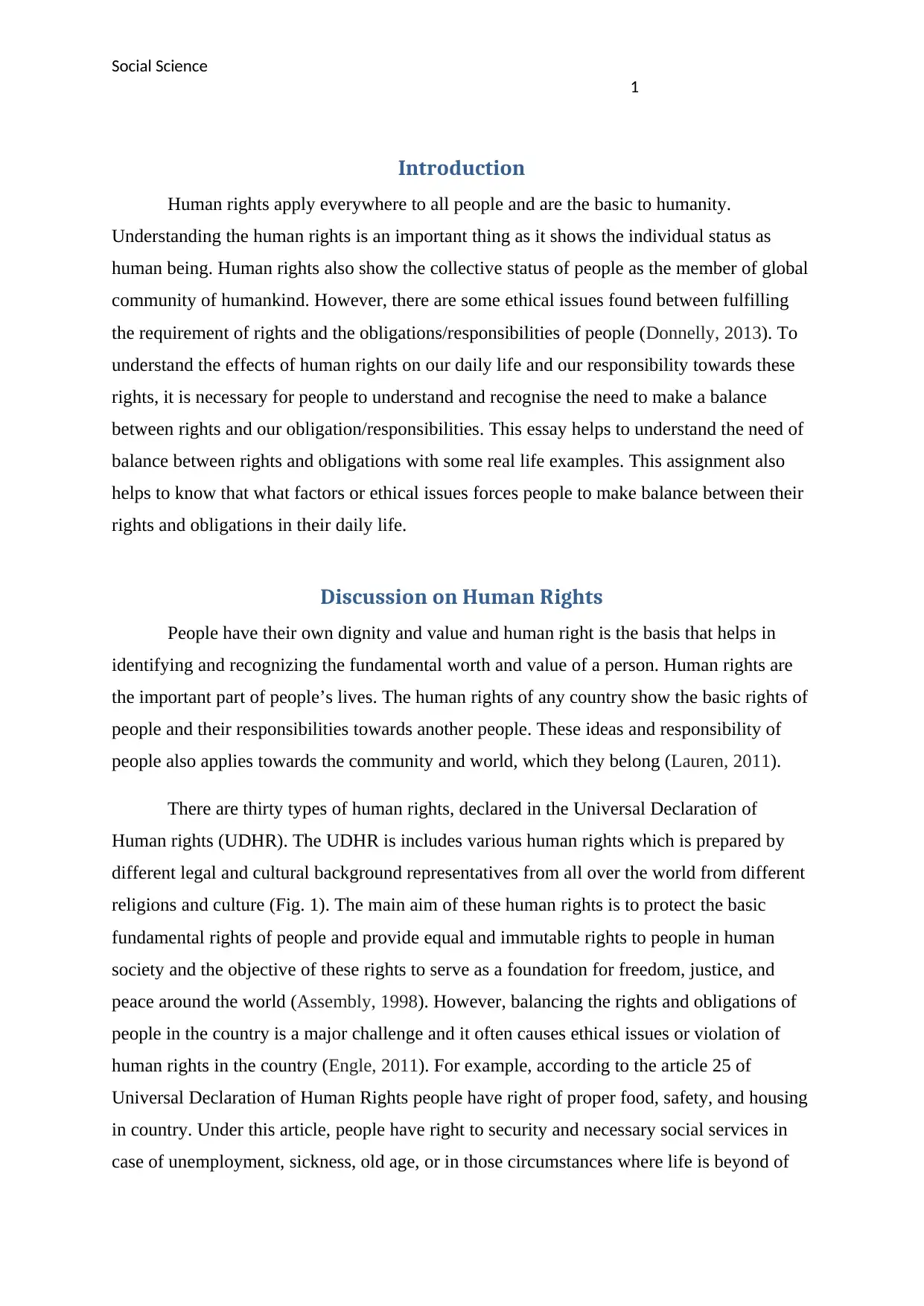
Social Science
1
Introduction
Human rights apply everywhere to all people and are the basic to humanity.
Understanding the human rights is an important thing as it shows the individual status as
human being. Human rights also show the collective status of people as the member of global
community of humankind. However, there are some ethical issues found between fulfilling
the requirement of rights and the obligations/responsibilities of people (Donnelly, 2013). To
understand the effects of human rights on our daily life and our responsibility towards these
rights, it is necessary for people to understand and recognise the need to make a balance
between rights and our obligation/responsibilities. This essay helps to understand the need of
balance between rights and obligations with some real life examples. This assignment also
helps to know that what factors or ethical issues forces people to make balance between their
rights and obligations in their daily life.
Discussion on Human Rights
People have their own dignity and value and human right is the basis that helps in
identifying and recognizing the fundamental worth and value of a person. Human rights are
the important part of people’s lives. The human rights of any country show the basic rights of
people and their responsibilities towards another people. These ideas and responsibility of
people also applies towards the community and world, which they belong (Lauren, 2011).
There are thirty types of human rights, declared in the Universal Declaration of
Human rights (UDHR). The UDHR is includes various human rights which is prepared by
different legal and cultural background representatives from all over the world from different
religions and culture (Fig. 1). The main aim of these human rights is to protect the basic
fundamental rights of people and provide equal and immutable rights to people in human
society and the objective of these rights to serve as a foundation for freedom, justice, and
peace around the world (Assembly, 1998). However, balancing the rights and obligations of
people in the country is a major challenge and it often causes ethical issues or violation of
human rights in the country (Engle, 2011). For example, according to the article 25 of
Universal Declaration of Human Rights people have right of proper food, safety, and housing
in country. Under this article, people have right to security and necessary social services in
case of unemployment, sickness, old age, or in those circumstances where life is beyond of
1
Introduction
Human rights apply everywhere to all people and are the basic to humanity.
Understanding the human rights is an important thing as it shows the individual status as
human being. Human rights also show the collective status of people as the member of global
community of humankind. However, there are some ethical issues found between fulfilling
the requirement of rights and the obligations/responsibilities of people (Donnelly, 2013). To
understand the effects of human rights on our daily life and our responsibility towards these
rights, it is necessary for people to understand and recognise the need to make a balance
between rights and our obligation/responsibilities. This essay helps to understand the need of
balance between rights and obligations with some real life examples. This assignment also
helps to know that what factors or ethical issues forces people to make balance between their
rights and obligations in their daily life.
Discussion on Human Rights
People have their own dignity and value and human right is the basis that helps in
identifying and recognizing the fundamental worth and value of a person. Human rights are
the important part of people’s lives. The human rights of any country show the basic rights of
people and their responsibilities towards another people. These ideas and responsibility of
people also applies towards the community and world, which they belong (Lauren, 2011).
There are thirty types of human rights, declared in the Universal Declaration of
Human rights (UDHR). The UDHR is includes various human rights which is prepared by
different legal and cultural background representatives from all over the world from different
religions and culture (Fig. 1). The main aim of these human rights is to protect the basic
fundamental rights of people and provide equal and immutable rights to people in human
society and the objective of these rights to serve as a foundation for freedom, justice, and
peace around the world (Assembly, 1998). However, balancing the rights and obligations of
people in the country is a major challenge and it often causes ethical issues or violation of
human rights in the country (Engle, 2011). For example, according to the article 25 of
Universal Declaration of Human Rights people have right of proper food, safety, and housing
in country. Under this article, people have right to security and necessary social services in
case of unemployment, sickness, old age, or in those circumstances where life is beyond of
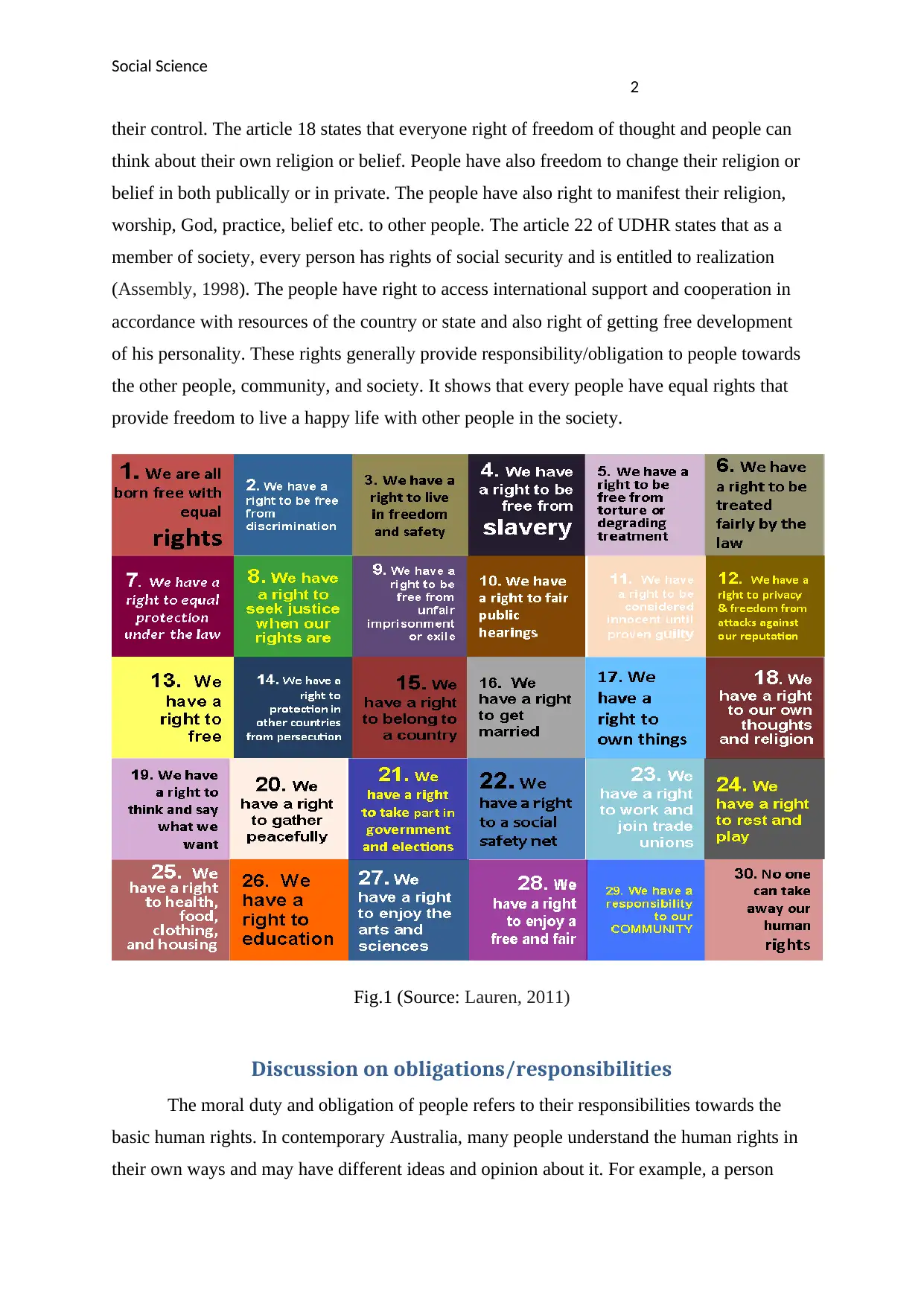
Social Science
2
their control. The article 18 states that everyone right of freedom of thought and people can
think about their own religion or belief. People have also freedom to change their religion or
belief in both publically or in private. The people have also right to manifest their religion,
worship, God, practice, belief etc. to other people. The article 22 of UDHR states that as a
member of society, every person has rights of social security and is entitled to realization
(Assembly, 1998). The people have right to access international support and cooperation in
accordance with resources of the country or state and also right of getting free development
of his personality. These rights generally provide responsibility/obligation to people towards
the other people, community, and society. It shows that every people have equal rights that
provide freedom to live a happy life with other people in the society.
Fig.1 (Source: Lauren, 2011)
Discussion on obligations/responsibilities
The moral duty and obligation of people refers to their responsibilities towards the
basic human rights. In contemporary Australia, many people understand the human rights in
their own ways and may have different ideas and opinion about it. For example, a person
2
their control. The article 18 states that everyone right of freedom of thought and people can
think about their own religion or belief. People have also freedom to change their religion or
belief in both publically or in private. The people have also right to manifest their religion,
worship, God, practice, belief etc. to other people. The article 22 of UDHR states that as a
member of society, every person has rights of social security and is entitled to realization
(Assembly, 1998). The people have right to access international support and cooperation in
accordance with resources of the country or state and also right of getting free development
of his personality. These rights generally provide responsibility/obligation to people towards
the other people, community, and society. It shows that every people have equal rights that
provide freedom to live a happy life with other people in the society.
Fig.1 (Source: Lauren, 2011)
Discussion on obligations/responsibilities
The moral duty and obligation of people refers to their responsibilities towards the
basic human rights. In contemporary Australia, many people understand the human rights in
their own ways and may have different ideas and opinion about it. For example, a person
⊘ This is a preview!⊘
Do you want full access?
Subscribe today to unlock all pages.

Trusted by 1+ million students worldwide
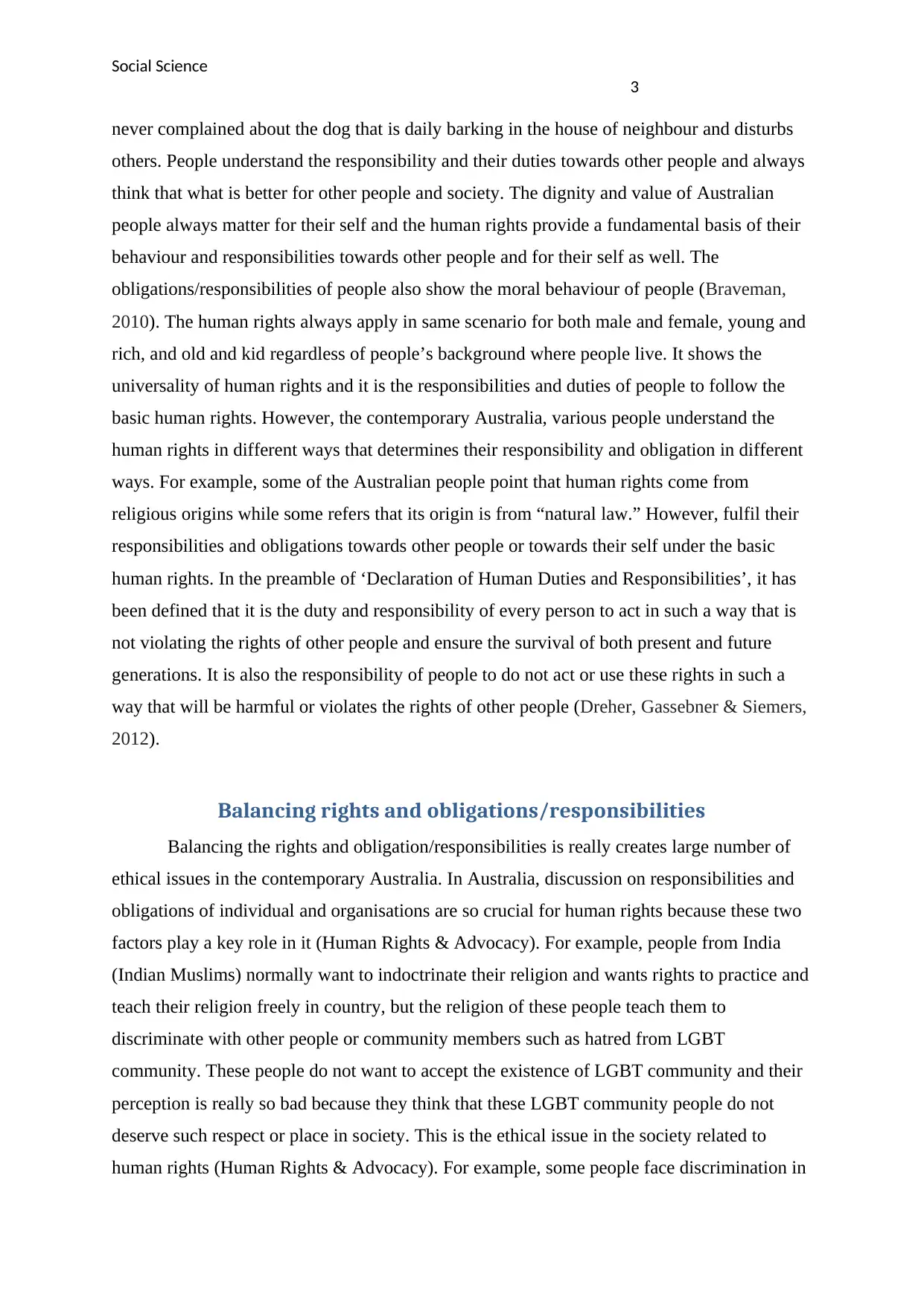
Social Science
3
never complained about the dog that is daily barking in the house of neighbour and disturbs
others. People understand the responsibility and their duties towards other people and always
think that what is better for other people and society. The dignity and value of Australian
people always matter for their self and the human rights provide a fundamental basis of their
behaviour and responsibilities towards other people and for their self as well. The
obligations/responsibilities of people also show the moral behaviour of people (Braveman,
2010). The human rights always apply in same scenario for both male and female, young and
rich, and old and kid regardless of people’s background where people live. It shows the
universality of human rights and it is the responsibilities and duties of people to follow the
basic human rights. However, the contemporary Australia, various people understand the
human rights in different ways that determines their responsibility and obligation in different
ways. For example, some of the Australian people point that human rights come from
religious origins while some refers that its origin is from “natural law.” However, fulfil their
responsibilities and obligations towards other people or towards their self under the basic
human rights. In the preamble of ‘Declaration of Human Duties and Responsibilities’, it has
been defined that it is the duty and responsibility of every person to act in such a way that is
not violating the rights of other people and ensure the survival of both present and future
generations. It is also the responsibility of people to do not act or use these rights in such a
way that will be harmful or violates the rights of other people (Dreher, Gassebner & Siemers,
2012).
Balancing rights and obligations/responsibilities
Balancing the rights and obligation/responsibilities is really creates large number of
ethical issues in the contemporary Australia. In Australia, discussion on responsibilities and
obligations of individual and organisations are so crucial for human rights because these two
factors play a key role in it (Human Rights & Advocacy). For example, people from India
(Indian Muslims) normally want to indoctrinate their religion and wants rights to practice and
teach their religion freely in country, but the religion of these people teach them to
discriminate with other people or community members such as hatred from LGBT
community. These people do not want to accept the existence of LGBT community and their
perception is really so bad because they think that these LGBT community people do not
deserve such respect or place in society. This is the ethical issue in the society related to
human rights (Human Rights & Advocacy). For example, some people face discrimination in
3
never complained about the dog that is daily barking in the house of neighbour and disturbs
others. People understand the responsibility and their duties towards other people and always
think that what is better for other people and society. The dignity and value of Australian
people always matter for their self and the human rights provide a fundamental basis of their
behaviour and responsibilities towards other people and for their self as well. The
obligations/responsibilities of people also show the moral behaviour of people (Braveman,
2010). The human rights always apply in same scenario for both male and female, young and
rich, and old and kid regardless of people’s background where people live. It shows the
universality of human rights and it is the responsibilities and duties of people to follow the
basic human rights. However, the contemporary Australia, various people understand the
human rights in different ways that determines their responsibility and obligation in different
ways. For example, some of the Australian people point that human rights come from
religious origins while some refers that its origin is from “natural law.” However, fulfil their
responsibilities and obligations towards other people or towards their self under the basic
human rights. In the preamble of ‘Declaration of Human Duties and Responsibilities’, it has
been defined that it is the duty and responsibility of every person to act in such a way that is
not violating the rights of other people and ensure the survival of both present and future
generations. It is also the responsibility of people to do not act or use these rights in such a
way that will be harmful or violates the rights of other people (Dreher, Gassebner & Siemers,
2012).
Balancing rights and obligations/responsibilities
Balancing the rights and obligation/responsibilities is really creates large number of
ethical issues in the contemporary Australia. In Australia, discussion on responsibilities and
obligations of individual and organisations are so crucial for human rights because these two
factors play a key role in it (Human Rights & Advocacy). For example, people from India
(Indian Muslims) normally want to indoctrinate their religion and wants rights to practice and
teach their religion freely in country, but the religion of these people teach them to
discriminate with other people or community members such as hatred from LGBT
community. These people do not want to accept the existence of LGBT community and their
perception is really so bad because they think that these LGBT community people do not
deserve such respect or place in society. This is the ethical issue in the society related to
human rights (Human Rights & Advocacy). For example, some people face discrimination in
Paraphrase This Document
Need a fresh take? Get an instant paraphrase of this document with our AI Paraphraser
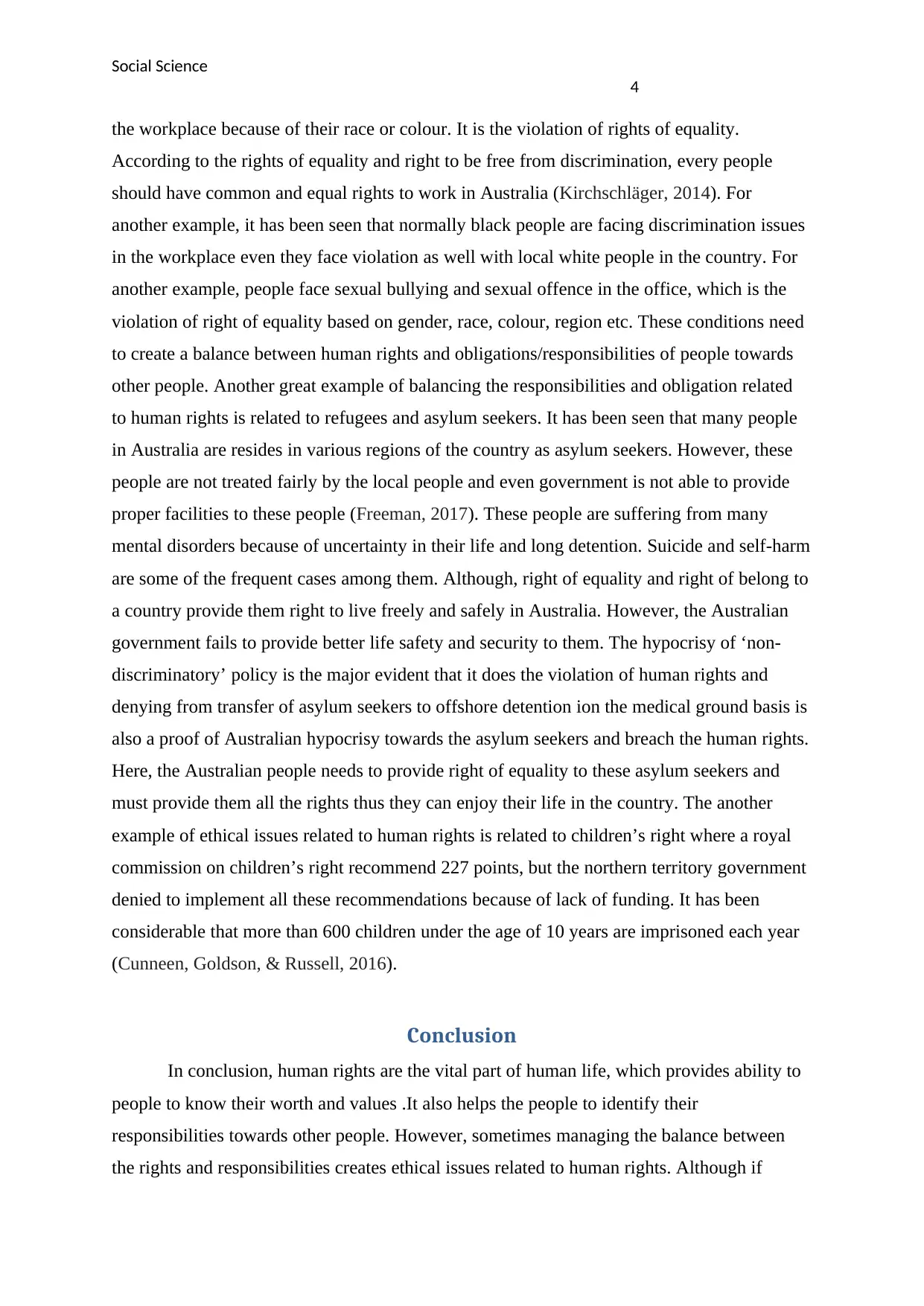
Social Science
4
the workplace because of their race or colour. It is the violation of rights of equality.
According to the rights of equality and right to be free from discrimination, every people
should have common and equal rights to work in Australia (Kirchschläger, 2014). For
another example, it has been seen that normally black people are facing discrimination issues
in the workplace even they face violation as well with local white people in the country. For
another example, people face sexual bullying and sexual offence in the office, which is the
violation of right of equality based on gender, race, colour, region etc. These conditions need
to create a balance between human rights and obligations/responsibilities of people towards
other people. Another great example of balancing the responsibilities and obligation related
to human rights is related to refugees and asylum seekers. It has been seen that many people
in Australia are resides in various regions of the country as asylum seekers. However, these
people are not treated fairly by the local people and even government is not able to provide
proper facilities to these people (Freeman, 2017). These people are suffering from many
mental disorders because of uncertainty in their life and long detention. Suicide and self-harm
are some of the frequent cases among them. Although, right of equality and right of belong to
a country provide them right to live freely and safely in Australia. However, the Australian
government fails to provide better life safety and security to them. The hypocrisy of ‘non-
discriminatory’ policy is the major evident that it does the violation of human rights and
denying from transfer of asylum seekers to offshore detention ion the medical ground basis is
also a proof of Australian hypocrisy towards the asylum seekers and breach the human rights.
Here, the Australian people needs to provide right of equality to these asylum seekers and
must provide them all the rights thus they can enjoy their life in the country. The another
example of ethical issues related to human rights is related to children’s right where a royal
commission on children’s right recommend 227 points, but the northern territory government
denied to implement all these recommendations because of lack of funding. It has been
considerable that more than 600 children under the age of 10 years are imprisoned each year
(Cunneen, Goldson, & Russell, 2016).
Conclusion
In conclusion, human rights are the vital part of human life, which provides ability to
people to know their worth and values .It also helps the people to identify their
responsibilities towards other people. However, sometimes managing the balance between
the rights and responsibilities creates ethical issues related to human rights. Although if
4
the workplace because of their race or colour. It is the violation of rights of equality.
According to the rights of equality and right to be free from discrimination, every people
should have common and equal rights to work in Australia (Kirchschläger, 2014). For
another example, it has been seen that normally black people are facing discrimination issues
in the workplace even they face violation as well with local white people in the country. For
another example, people face sexual bullying and sexual offence in the office, which is the
violation of right of equality based on gender, race, colour, region etc. These conditions need
to create a balance between human rights and obligations/responsibilities of people towards
other people. Another great example of balancing the responsibilities and obligation related
to human rights is related to refugees and asylum seekers. It has been seen that many people
in Australia are resides in various regions of the country as asylum seekers. However, these
people are not treated fairly by the local people and even government is not able to provide
proper facilities to these people (Freeman, 2017). These people are suffering from many
mental disorders because of uncertainty in their life and long detention. Suicide and self-harm
are some of the frequent cases among them. Although, right of equality and right of belong to
a country provide them right to live freely and safely in Australia. However, the Australian
government fails to provide better life safety and security to them. The hypocrisy of ‘non-
discriminatory’ policy is the major evident that it does the violation of human rights and
denying from transfer of asylum seekers to offshore detention ion the medical ground basis is
also a proof of Australian hypocrisy towards the asylum seekers and breach the human rights.
Here, the Australian people needs to provide right of equality to these asylum seekers and
must provide them all the rights thus they can enjoy their life in the country. The another
example of ethical issues related to human rights is related to children’s right where a royal
commission on children’s right recommend 227 points, but the northern territory government
denied to implement all these recommendations because of lack of funding. It has been
considerable that more than 600 children under the age of 10 years are imprisoned each year
(Cunneen, Goldson, & Russell, 2016).
Conclusion
In conclusion, human rights are the vital part of human life, which provides ability to
people to know their worth and values .It also helps the people to identify their
responsibilities towards other people. However, sometimes managing the balance between
the rights and responsibilities creates ethical issues related to human rights. Although if
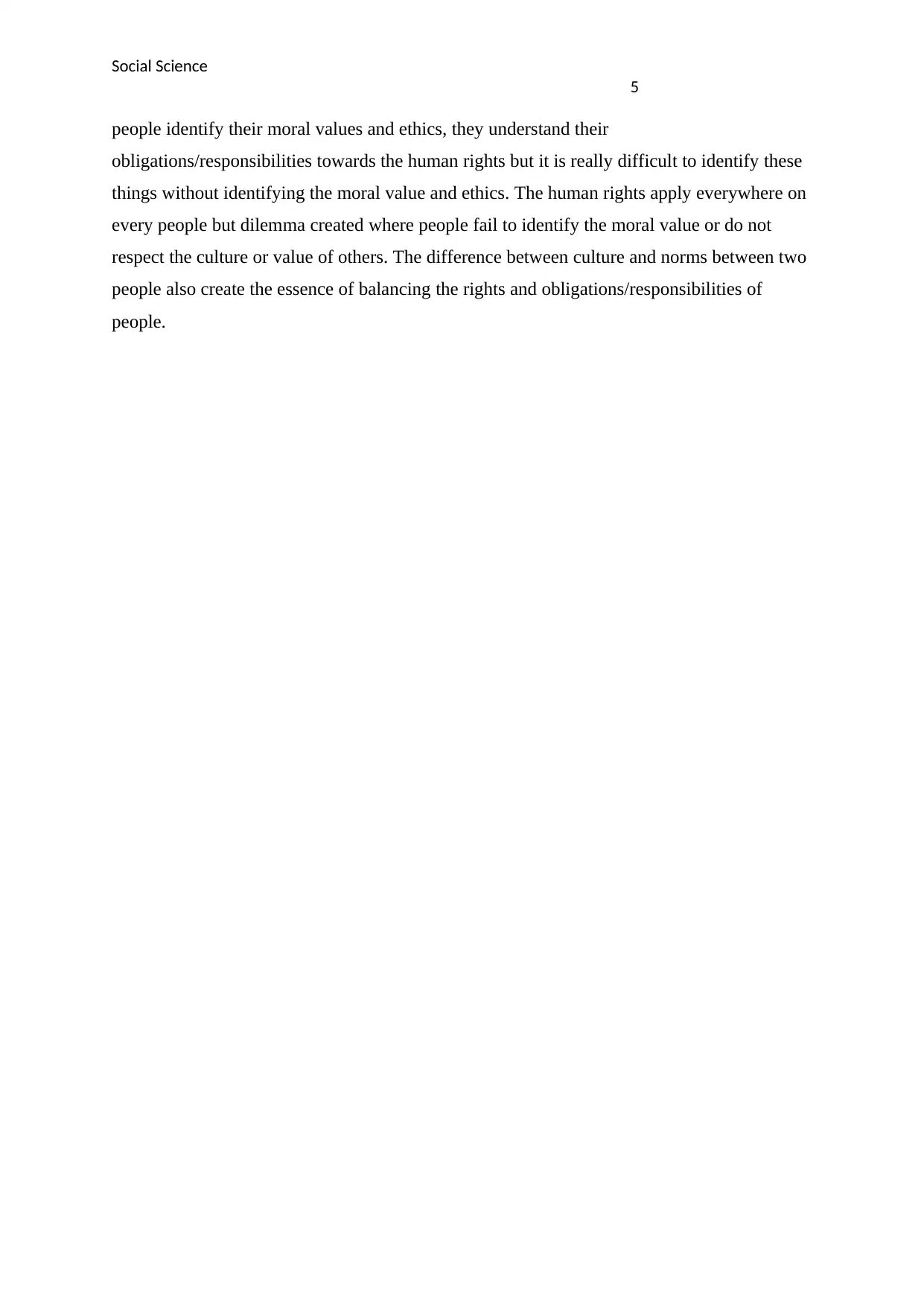
Social Science
5
people identify their moral values and ethics, they understand their
obligations/responsibilities towards the human rights but it is really difficult to identify these
things without identifying the moral value and ethics. The human rights apply everywhere on
every people but dilemma created where people fail to identify the moral value or do not
respect the culture or value of others. The difference between culture and norms between two
people also create the essence of balancing the rights and obligations/responsibilities of
people.
5
people identify their moral values and ethics, they understand their
obligations/responsibilities towards the human rights but it is really difficult to identify these
things without identifying the moral value and ethics. The human rights apply everywhere on
every people but dilemma created where people fail to identify the moral value or do not
respect the culture or value of others. The difference between culture and norms between two
people also create the essence of balancing the rights and obligations/responsibilities of
people.
⊘ This is a preview!⊘
Do you want full access?
Subscribe today to unlock all pages.

Trusted by 1+ million students worldwide
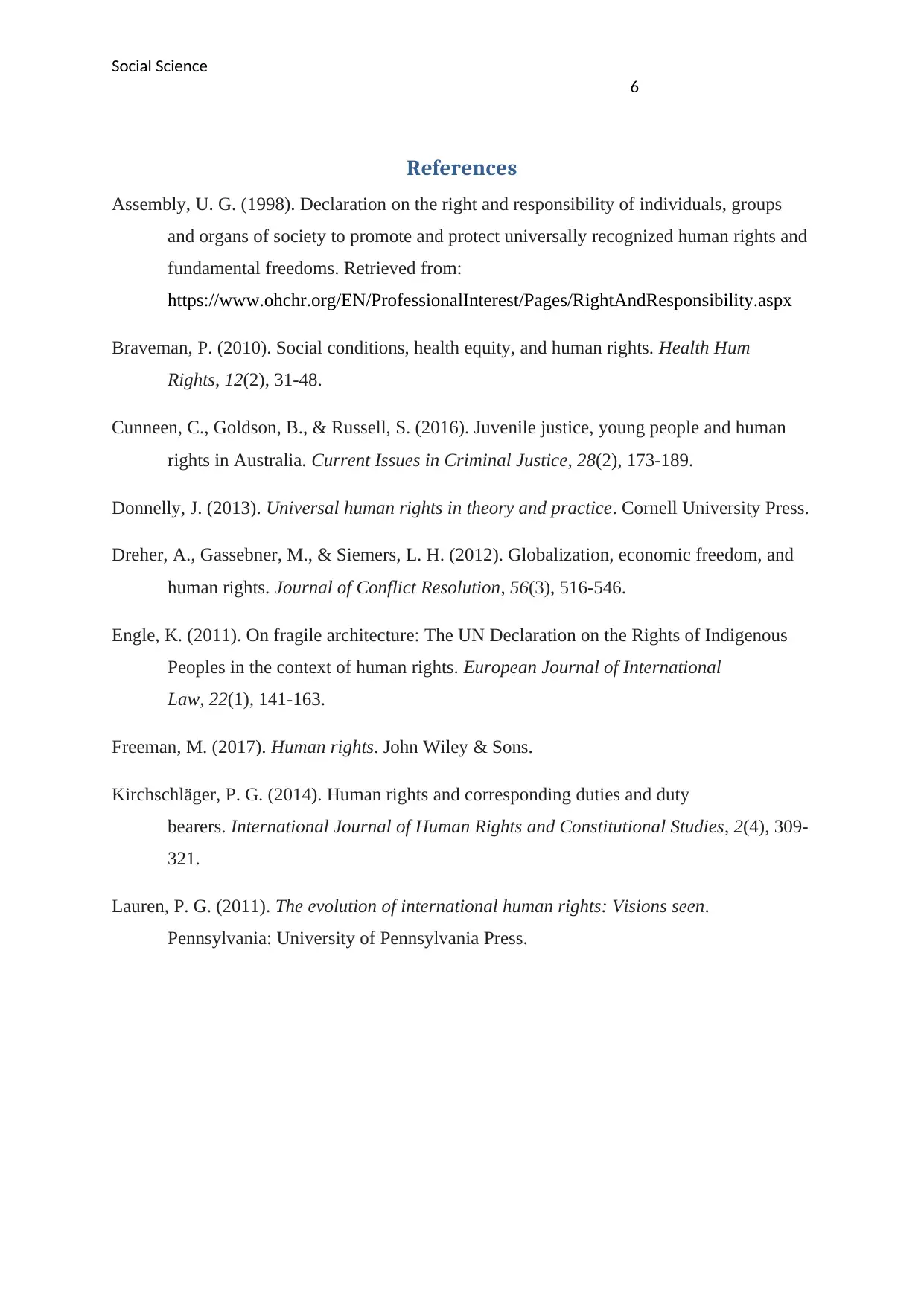
Social Science
6
References
Assembly, U. G. (1998). Declaration on the right and responsibility of individuals, groups
and organs of society to promote and protect universally recognized human rights and
fundamental freedoms. Retrieved from:
https://www.ohchr.org/EN/ProfessionalInterest/Pages/RightAndResponsibility.aspx
Braveman, P. (2010). Social conditions, health equity, and human rights. Health Hum
Rights, 12(2), 31-48.
Cunneen, C., Goldson, B., & Russell, S. (2016). Juvenile justice, young people and human
rights in Australia. Current Issues in Criminal Justice, 28(2), 173-189.
Donnelly, J. (2013). Universal human rights in theory and practice. Cornell University Press.
Dreher, A., Gassebner, M., & Siemers, L. H. (2012). Globalization, economic freedom, and
human rights. Journal of Conflict Resolution, 56(3), 516-546.
Engle, K. (2011). On fragile architecture: The UN Declaration on the Rights of Indigenous
Peoples in the context of human rights. European Journal of International
Law, 22(1), 141-163.
Freeman, M. (2017). Human rights. John Wiley & Sons.
Kirchschläger, P. G. (2014). Human rights and corresponding duties and duty
bearers. International Journal of Human Rights and Constitutional Studies, 2(4), 309-
321.
Lauren, P. G. (2011). The evolution of international human rights: Visions seen.
Pennsylvania: University of Pennsylvania Press.
6
References
Assembly, U. G. (1998). Declaration on the right and responsibility of individuals, groups
and organs of society to promote and protect universally recognized human rights and
fundamental freedoms. Retrieved from:
https://www.ohchr.org/EN/ProfessionalInterest/Pages/RightAndResponsibility.aspx
Braveman, P. (2010). Social conditions, health equity, and human rights. Health Hum
Rights, 12(2), 31-48.
Cunneen, C., Goldson, B., & Russell, S. (2016). Juvenile justice, young people and human
rights in Australia. Current Issues in Criminal Justice, 28(2), 173-189.
Donnelly, J. (2013). Universal human rights in theory and practice. Cornell University Press.
Dreher, A., Gassebner, M., & Siemers, L. H. (2012). Globalization, economic freedom, and
human rights. Journal of Conflict Resolution, 56(3), 516-546.
Engle, K. (2011). On fragile architecture: The UN Declaration on the Rights of Indigenous
Peoples in the context of human rights. European Journal of International
Law, 22(1), 141-163.
Freeman, M. (2017). Human rights. John Wiley & Sons.
Kirchschläger, P. G. (2014). Human rights and corresponding duties and duty
bearers. International Journal of Human Rights and Constitutional Studies, 2(4), 309-
321.
Lauren, P. G. (2011). The evolution of international human rights: Visions seen.
Pennsylvania: University of Pennsylvania Press.
1 out of 7
Related Documents
Your All-in-One AI-Powered Toolkit for Academic Success.
+13062052269
info@desklib.com
Available 24*7 on WhatsApp / Email
![[object Object]](/_next/static/media/star-bottom.7253800d.svg)
Unlock your academic potential
Copyright © 2020–2026 A2Z Services. All Rights Reserved. Developed and managed by ZUCOL.





